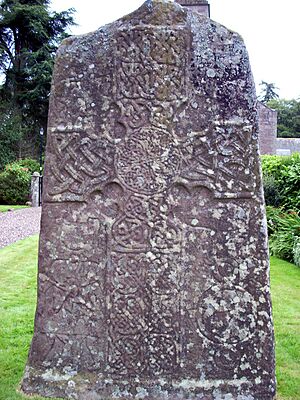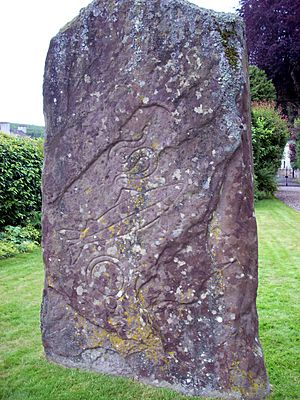Glamis Manse Stone facts for kids
Quick facts for kids The Glamis Manse Stone |
|
|---|---|

The front of the Glamis Manse Stone with its intricately carved cross.
|
|
| Material | Old Red Sandstone |
| Height | 2.76 metres (9 ft 1 in) |
| Symbols |
|
| Created | Ninth Century CE |
| Discovered | 1811 |
| Place | Glamis, Angus, Scotland |
| Classification | Type II cross slab |
| Culture | Picto-Scottish |
The Glamis Manse Stone, also known as Glamis 2, is a special ancient stone from the Pictish people. It stands in the village of Glamis, in Angus, Scotland. This stone was made around the 9th century, which is over 1,100 years ago! You can find it outside the Manse, which is a house often used by a church minister, near the local church.
One side of the stone has a beautiful Celtic cross carved into it. The other side shows many interesting Pictish symbols. Because it is so old and important, the Glamis Manse Stone is protected as a scheduled monument. This means it's a very important historical site that must be preserved.
Contents
Where is the Glamis Manse Stone?
This ancient stone is located at the northeast edge of Glamis village. It stands in the garden area of the Manse. The Manse is a house very close to St Fergus church.
What Does the Glamis Stone Look Like?
The Glamis Manse Stone is a type of stone called a cross-slab. This means it's a tall, flat stone with a cross carved on one side. It stands about 2.76 metres (9 ft 1 in) tall, which is taller than a basketball hoop! It is also 1.5 metres (4 ft 11 in) wide and about 24 centimetres (9.4 in) thick.
Carvings on the Front (Cross Side)
The front of the stone has a large Celtic cross carved into it. This carving is done in relief, which means the design sticks out from the stone's surface. The cross has a circular shape in the middle and fancy patterns called knotwork interlace. These patterns look like woven ropes or braids.
Around the cross, there are other interesting carvings:
- In the bottom left, you can see two men who look like they are fighting with axes.
- Above them, there's a strange image that looks like a cooking pot with human legs hanging out of it.
- In the bottom right, there's a carving that might be a deer or a dog's head. Below it is a symbol called a triple disc.
- The top right shows a centaur, which is a mythical creature that is half-human and half-horse. This centaur is holding two axes.
- In the top left, there's a carving that some people think looks like a lion.
Symbols on the Back of the Stone
The back of the stone has three symbols carved into it. These carvings are incised, meaning they are cut into the stone's surface, rather than sticking out.
- At the top, there is a serpent.
- Below the serpent, there is a fish.
- At the bottom, there is a mirror symbol.
Some experts have noticed that the cross on the front isn't perfectly straight. This might have been done on purpose or it could be a small mistake from when it was carved long ago.
The Glamis Stone and Other Ancient Stones
The Glamis Manse Stone is part of a group of similar Pictish stones. Experts call this group the "Aberlemno School" of Pictish sculpture. This means these stones share a similar style of carving and design. Other famous stones in this group include:
- Aberlemno 2 (the Kirkyard Stone)
- Aberlemno 3
- Monifieth 2
- Eassie Stone
- Glamis 1 (Hunter's Hill)
These stones help us learn more about the ancient Pictish people who lived in Scotland many centuries ago. They tell us about their art, their beliefs, and their way of life.
Images for kids
 | Laphonza Butler |
 | Daisy Bates |
 | Elizabeth Piper Ensley |



